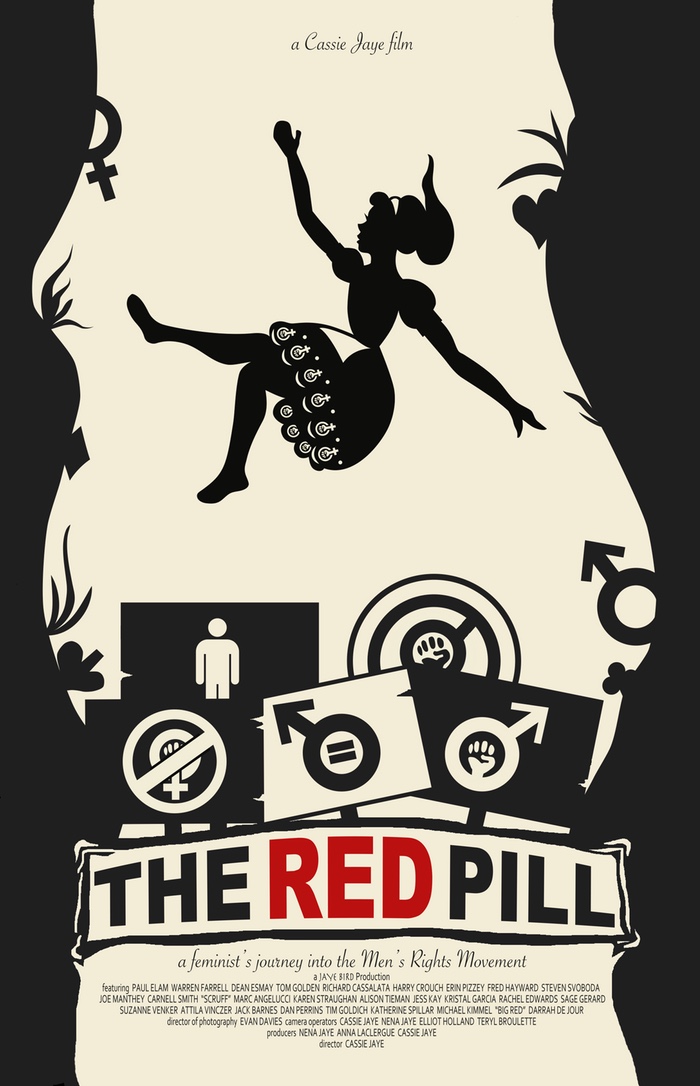
 Mostly
unknown actress Cassie Jaye takes a turn at filmmaking in The Red
Pill, a long but provocative documentary in which she seeks to
uncover information about the Men's Rights movement taking root on the
internet. Prior to her exploration, Jaye considers herself a
feminist who has believed firmly in the fight for womens' rights, so
hearing that there are men who claim to be victims who need additional
rights runs entirely counter to her view of American society as
patriarchal and stacked against women to succeed.
Mostly
unknown actress Cassie Jaye takes a turn at filmmaking in The Red
Pill, a long but provocative documentary in which she seeks to
uncover information about the Men's Rights movement taking root on the
internet. Prior to her exploration, Jaye considers herself a
feminist who has believed firmly in the fight for womens' rights, so
hearing that there are men who claim to be victims who need additional
rights runs entirely counter to her view of American society as
patriarchal and stacked against women to succeed.
The Mens Rights Advocates (MRAs) are a bit of a rag-tag group as a
movement, but they are united in their effort to suggest that there
are problems in society that have led to a lesser quality of life for
men, who have shorter lifespans on average then women, much higher
rates of suicide, and far less legal recourse in such things as
parental rights and domestic abuse. Talking head interviews as
well as clips from public appearances show us some of the main topics
of the leaders within the mens rights movement, such as Paul Elam
(coincidentally, 'male' backwards), Fred Hayward and Warren Farrell.
The "red pill" of the title refers to an MRA metaphor derived from
The Matrix as to whether people will
choose to live in blissful ignorance in the world as we usually
perceive it (Morpheus' blue pill), or whether to take the 'red pill'
and see the world in a new light of how it really works. Jaye
likens her journey into men's rights as 'going down the rabbit hole',
a la "Alice in Wonderland", into a realm in which things are hard to
decipher because they largely lie outside the issues in public
discussion. It's an underground movement that very few seem to
want to hear.
The film tries to stay balanced in its approach at getting both sides
of the argument out there, though there is some personal bias employed
by Jaye in trying to give us her feelings as she journeys into the
realm of the MRAs and whether or not she can sympathize with their
positions, which are generally considered anywhere from misguided to
hateful, depending on the person making the judgments. Radical
feminists are shown as being quite vocal in trying to shut down the
MRAs whenever and wherever they may appear in public discourse, often
associating them as they might a member of the Nazi Party or Ku Klux
Klan.
While Jaye's experience with the MRAs may be personal, she does lend
an air of credibility because she's a woman making this film, and also
she is actively struggling with her own feelings as she is exposed to
lots of new information out there that she had either disregarded as
male blow-back for feminism, or had not been allowed to understand
because others have labeled it all as misogynist hate speech.
What the men are asking for, in some way, is for equal rights, both
for men and women. Currently, only men can be drafted into the
military, and have little to no say in what happens with the fetus
once a woman is pregnant, or even once the baby is born.
However, as mostly men are the ones that have made the laws, and they
are the politicians that make the wars that send young men to war to
die, notions of men being oppressed are likely to not hold much water
beyond the MRA rank and file.
If there's one thing the film throws out a the beginning but isn't
quite dealt with, it's the high degrees of real misogynistic language
women often see and experience on the internet from men on the
discussion forums of these Men's Rights Activist groups. It's
something that the men interviewed aren't pressed about (not that
these statements came from them), but it is certainly something that
one can't seem to avoid when researching the MRA stances. The
men interviewed here are measured and approachable, and while they may
not be responsible for the vitriol spewed toward women from their
supporters, they also don't have the opportunity to try to quell or
condemn the hatefulness coming from their sides. Even those who
may be swayed by the rather clawless leaders shown in the men's
movement may find themselves recoiling back to their prior ways of
thinking once they get a taste of bitter misogyny found by many of
those willing to side on that side of the cause.
While feminists may likely continue to disregard The Red Pill
as unconvincing, Jaye is successful at showcasing the intentions of
the MRAs as not quite as hateful as they have been labeled by those
who are against their movement. While society would still seem
to be a primarily uphill battle for women to achieve equality, the
film does effectively showcase a few health-related areas in which men
are having a difficult time in trying to express their own feelings
toward fundamental issues, leading to a diminished quality of life or
injustice in the law. Your own thoughts may not change on the subject,
but, at the very least, The Red Pill does raise some
challenging questions, though for many, the biggest question is why
whether all defined gender roles might need to be put to bed for the
sake of true equality, and whether this can ever be achieved.
Qwipster's rating:







©2017 Vince Leo

 Mostly
unknown actress Cassie Jaye takes a turn at filmmaking in The Red
Pill, a long but provocative documentary in which she seeks to
uncover information about the Men's Rights movement taking root on the
internet. Prior to her exploration, Jaye considers herself a
feminist who has believed firmly in the fight for womens' rights, so
hearing that there are men who claim to be victims who need additional
rights runs entirely counter to her view of American society as
patriarchal and stacked against women to succeed.
Mostly
unknown actress Cassie Jaye takes a turn at filmmaking in The Red
Pill, a long but provocative documentary in which she seeks to
uncover information about the Men's Rights movement taking root on the
internet. Prior to her exploration, Jaye considers herself a
feminist who has believed firmly in the fight for womens' rights, so
hearing that there are men who claim to be victims who need additional
rights runs entirely counter to her view of American society as
patriarchal and stacked against women to succeed.